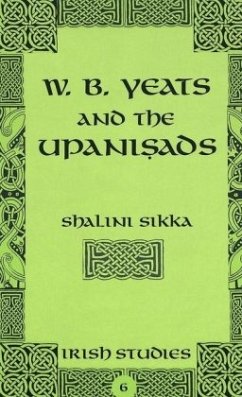This book focuses on the Irish Nobel laureate W. B. Yeats (1865-1939), and his interest in the Upanisads, the ancient Sanskrit scriptures of India. Yeats undertook to assist the Indian monk Shree Purohit Swami in the task of translating the Ten Principal Upanishads into English. Not only did Yeats impart the qualities of spontaneity and fidelity into the work, but also managed to enhance his own creativity. The philosophy of the Upanisads enabled him to better understand and revise certain sections of A Vision: the Sphere or ultimate reality, the lunar symbolism and eschatology. Yeats found in the Upanisads a confirmation of his belief in the immortality of the soul, something he had sought to prove through countless visits to séances. Yeats also discovered a parallel for his concept of Unity of Being in Turiya, a final stage in meditation wherein bliss and a consciousness of unity are achieved. Imagination, he discovered, was a faculty of the Atman or Self. It created the imagesin anima mundi seen in their trances by seers and poets. To Yeats, imagination explained the nature of revelation. Finally, just as an Upanisadic seer meditated upon any object chosen from the universe in order to reach the formless reality beyond, a poet could use symbols that a reader would meditate upon, thus evoking the original experience of the poet in the reader's mind.
"Yeats's absorption in Upanisadic thought is a subject that criticism has hitherto skirted, or treated warily. Here, for the first time, is an exploration by an author who combines a deep immersion in the subject with a rich understanding of Yeats's development as a poet and a thinker. Shalini Sikka examines and explains the reasons for Yeats's turning to the Upanisads where he found 'an ancient discipline, a philosophy that satisfied the intellect' (Yeats). Written with grace and lucidity and based on impeccable scholarship, this book is a must buy for any Yeats aficionado." (R. W. Desai, Former Professor of English, University of Delhi; Author of 'Yeats's Shakespeare'; Editor of 'Hamlet Studies')
"Yeats realized through his study of the Upanisads that knowledge and wisdom are both indispensable for the healthy conduct of life. While knowledge of the arts and sciences is necessary for life in the worldly/social spheres, a dilution of the ego is essential for preparing the mind for communion with the spiritual hierarchy; the dawn of wisdom solves riddles which cannot be tackled through mundane know-how. The presence of these ideas in Yeats's writings is the subject of Shalini Sikka's book." (B. R. Sharma, Professor of Sanskrit, University of Delhi; Author of 'The Concept of Atman in the Principal Upanisads')
"Shalini Sikka's well-researched book explores many new sites wherein Yeats's thought intriguingly relates to the thought of the Upanisads. New light is thrown, among other things, on Yeats's view of the imagination, his concept of Unity of Being, and on the bewildering symbolism of A Vision." (G. K. Das, Former Professor of English, University of Delhi; Vice-Chancellor, Utkal University, Bhubaneswar, Orissa)
"Yeats realized through his study of the Upanisads that knowledge and wisdom are both indispensable for the healthy conduct of life. While knowledge of the arts and sciences is necessary for life in the worldly/social spheres, a dilution of the ego is essential for preparing the mind for communion with the spiritual hierarchy; the dawn of wisdom solves riddles which cannot be tackled through mundane know-how. The presence of these ideas in Yeats's writings is the subject of Shalini Sikka's book." (B. R. Sharma, Professor of Sanskrit, University of Delhi; Author of 'The Concept of Atman in the Principal Upanisads')
"Shalini Sikka's well-researched book explores many new sites wherein Yeats's thought intriguingly relates to the thought of the Upanisads. New light is thrown, among other things, on Yeats's view of the imagination, his concept of Unity of Being, and on the bewildering symbolism of A Vision." (G. K. Das, Former Professor of English, University of Delhi; Vice-Chancellor, Utkal University, Bhubaneswar, Orissa)

